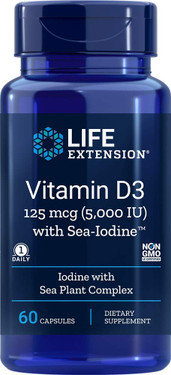 Loading... Please wait...
Loading... Please wait...- Home
- Conditions
- D3 with Sea-Iodine, 5000IU 60 Caps, Life Extension
D3 with Sea-Iodine, 5000IU 60 Caps, Life Extension
Life Extension
Product Description
|
D3 with Sea-Iodine 5000IU 60 Caps, Life Extension
Any reviews or opinions expressed in manufacturer description is not endorsed by our store. Always consult a qualified professional. Always Read Label Before Using This Product. Vitamin D3 with Sea-Iodine™ |
| Vitamin D3 can be synthesized by humans in the skin upon exposure to ultraviolet-B (UVB) radiation from sunlight. But, due to winter season, weather conditions, and sun screen use, the body's ability to produce optimal vitamin D levels may be inhibited.These factors point to the value of taking a daily vitamin D supplement.
Vitamin D has long provided significant support for healthy bone density. However, scientists have also validated the critical role that vitamin D plays in regulating healthy cell division and differentiation, and its profound effects on human immunity. These findings link a deficiency of vitamin D to a host of common age-related problems. The current RDA is only 600 IU. As a result of startling evidence of widespread vitamin D deficiency, prominent nutritional scientists are calling on Americans to increase their vitamin D intake to 1,000 IU per day and higher. Currently, most experts in the field believe that intakes of between 1,000 and 10,000 IU for adults will lead to serum 25(OH)D levels above those indicative of vitamin D deficient levels, at approximately 80 nmol/L or 32 ng/mL. Life Extension recommends that healthy adults supplement each day with at least 2,000 IU of vitamin D. Elderly adults may benefit from higher doses such as 5,000 IU daily up to 10,000 IU daily. The objective of taking a vitamin D supplement is to achieve an optimal 25-hydroxy vitamin D blood level of between 50-80 ng/mL. Sea-Iodine™The organic algae and potassium iodide found in Sea-Iodine™ provide you with over 667% of the Recommended Daily Value of iodine. Iodine is a health-promoting trace element essential for life. Its primary biological role lies in the production of the thyroid system triiodothyronine (T3) and thyroxine (T4). T4 and T3 contain four and three atoms of iodine per molecule, respectively. The thyroid gland actively absorbs iodide from the blood to make and release these hor mones into the blood. Iodine happens to be found abundantly in sea vegetables and plants. In areas where no marine foods are eaten, people have lower iodine levels. For this reason, US commercial salt makers have long added iodine to deliver this key ingredient to your diet. However, we now know the concerns associated with eating too much table salt, which resurrects the dilemma of where to get healthy sources of iodine. Ironically, health-conscious people are often the most likely to develop low iodine levels.One reason is that athletes and people engaged in heavy physical effort deplete their natural stores of this trace mineral through perspiration. Vegetarians also have a substantially greater likelihood of low levels of iodine than omnivorous individuals, since foods of plant origin are less rich in iodine than animal-derived foods. One study demonstrated iodine deficiency in 25% of vegetarians and an incredible 80% of vegans. |
| Supplement Facts: | ||||||||||||
|
||||||||||||
| Suggested Use: | ||||||||||||
|
||||||||||||
| Caution: | ||||||||||||
| Individuals consuming more than 2,000 IU/day of vitamin D (from diet and supplements) should periodically obtain a serum 25-hydroxy vitamin D measurement. Do not exceed 10,000 IU per day unless recommended by a licensed professional. Vitamin D supplementation is not recommended for individuals with high blood calcium levels. If you have a thyroid condition or are taking antithyroid supplements, do not use without consulting your qualified professional. | ||||||||||||
| Warnings: | ||||||||||||
|
||||||||||||
Disclaimer: These products are not intended to diagnose, treat, cure, or prevent any disease.
UPC: 737870175865















